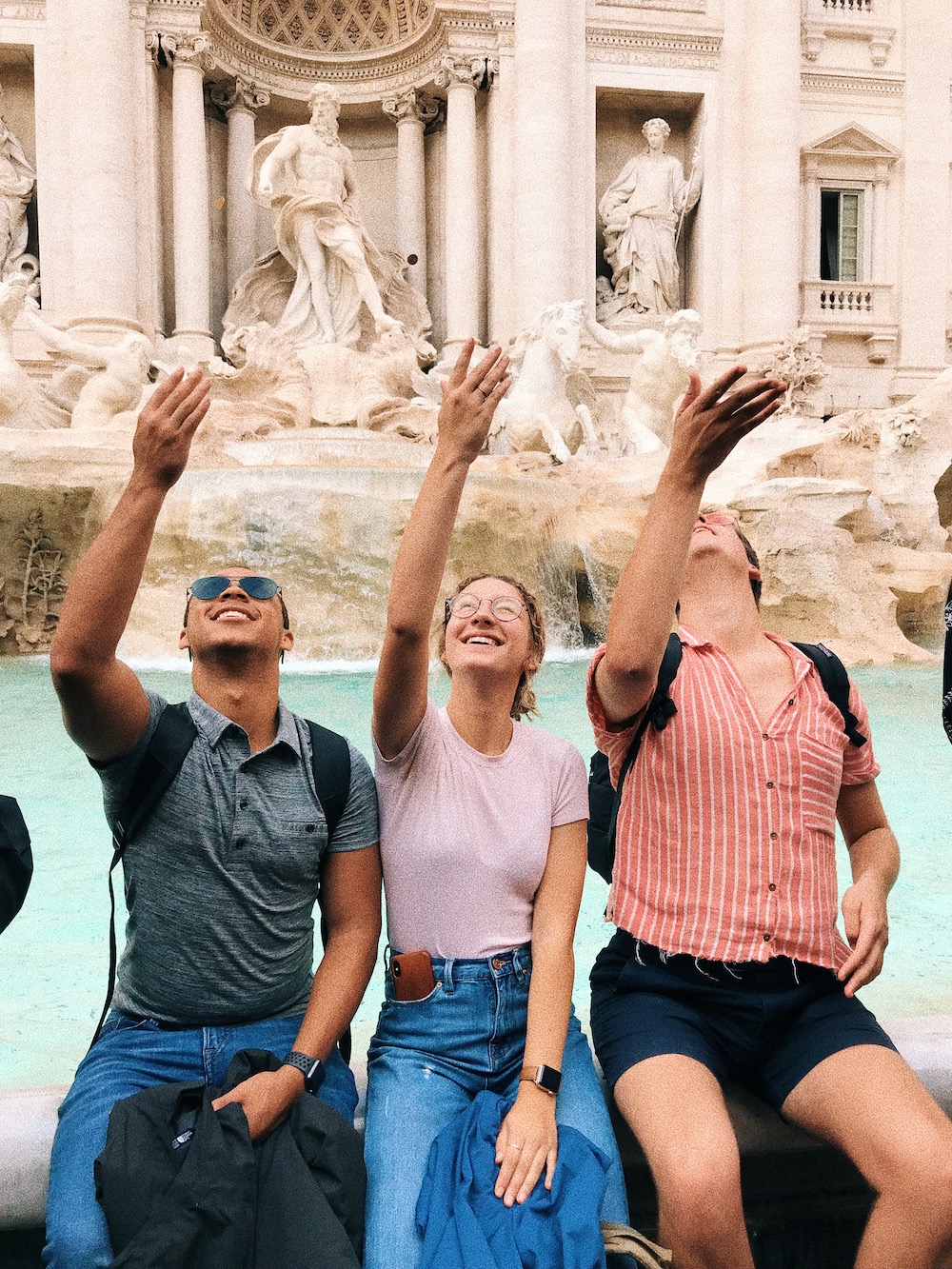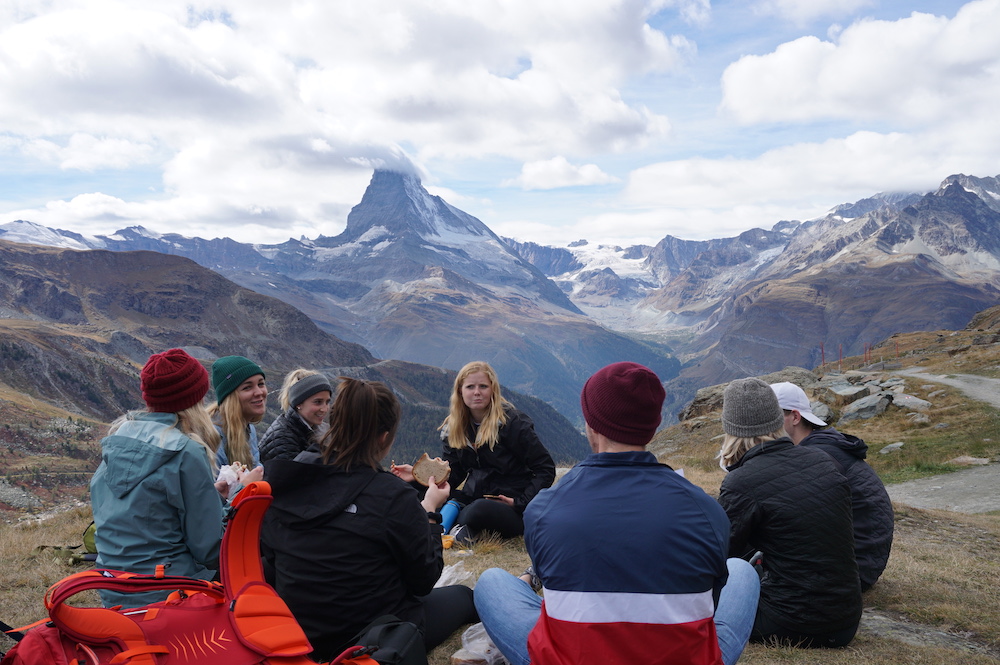Managing Your Money Abroad
Studying abroad is a great time to work on developing good money management habits. This may be your first opportunity to independently budget your money and resources over an extended period - all while having an absolute blast. We have compiled a few tips and tricks to help you to think about the role that money will play in your international experience.
When Do I Pay?
Charges for tuition, room and board, your IP fee (only for fall and/or spring programs), and any relevant local country fees will post to your student account before your departure date. Charges are usually due within the first week of the program, but exact due dates are posted on Wavenet.
Click here to learn more about the costs for your program, and see program-specific cost sheets.
Financial aid and scholarships will post to your student account a few days before the program begins. You can get a sense of how much aid you will receive by using the estimators on the Financial Aid website. Contact your Financial Aid Advisor if you have specific questions about loans, scholarships, or grants. As a general rule, the same percentage of aid you receive on campus will apply to your abroad costs.
Contact Student Accounts if you are interested in setting up a payment plan, or if you have questions about when or how to pay.
How Will I Access Money Abroad?
1. Talk to Your Bank
Before you depart, talk to your bank about your options. It's smart to consider applying for a credit or debit card that will allow you to avoid international transaction and ATM fees. Request a credit or debit card with a chip and pin to ensure it can be used internationally. You should also ensure your bank and/or credit card company know when and where you are traveling, so they don't shut off your card as soon as you arrive.
2. Set Up Digital Disbursements
Select summer programs and all academic year programs except Florence* receive digital disbursements. A portion of the funds students pay to the university through the room and board charge is returned in the form of digital disbursements. Digital disbursements are cash payments sent to each student's personal bank account about once per month, to assist them in paying for meals. The amount of digital disbursements received per month depends on the program and the number of meals the digital disbursement is intended to cover.
To set up digital disbursements, students should follow instructions in the email sent to them a few days prior to their departure. In order to receive the funds, students must have access to a U.S.-based debit account, online banking connected to their Pepperdine email account, and a debit/ATM card. Although we utilize Chase Bank to send the digital disbursements, students can have a debit account with any U.S.-based bank.
Bonus tip: Some students save a portion of their digital disbursements to cover travel costs by choosing lower cost meals, cooking at the house or packing a lunch, rather than eating out.
*Florence students - we hope you enjoy your personal chef!
3. Keep Your Money Secure
One way to avoid excessive ATM fees is to withdraw large amounts of cash at one time, and then keep the cash in a secure location. We recommend withdrawing cash near your IP campus location (while with a group of friends, not alone!). Immediately return to your program location and put your cash in a safe or other secure place. When traveling, don't bring too much cash or valuables with you, and keep them in separate physical locations so that you are less likely to lose everything at once. Consider investing in a money belt or other method of concealing your valuables while traveling.
4. Have Access to Cash and Credit Cards at All Times
You should always have some cash as well as a credit card available for urgent situations. Be ready to pay for a taxi, an unexpected travel visa, and medical services if needed.
What about Personal Expenses?
Learn about the financial norms in your location in advance! Talk to an IP ambassador, program alum, or staff member about financial transactions in your abroad location. Some good questions to ask:
- Did you primarily use cash, card, or another method of payment?
- How did you obtain cash abroad? Did you bring any of your location's currency with you from the United States?*
- How easy was it to access money in your location?
- Is it customary to tip there? How much?
*We recommend obtaining cash from an ATM or bank, rather than a currency exchange service, as they usually offer the best rates.
Still have money-related questions? Each year we host Financial Literacy Workshops to help you learn more about managing money in your program location. Check out our Calendar Page to see upcoming events, or view recordings of our past webinars here.
Additional resources:

Don't throw your money away (unless you're making a wish of course)!
Alumni Tips for Managing Your Money Abroad
Studying abroad is a great opportunity to develop smart money management habits that you can carry with you for the rest of your life. Making smart financial choices takes planning and persistence, wherever you are, so think of studying abroad as your first big opportunity to grow in this area. The IP Ambassadors have a few tips and tricks to help you get started:
1. Develop a Budget, and Prioritize!
"I recommend having a realistic budget (whether it's actually typed out or just in your head) while you're there. This will help you stay on track, as well as prioritize things you really want to do versus things you could go without doing." - Mackenzie Winslow, Former Lausanne Ambassador
"My advice is that abroad does cost money but budgeting can be easy and effective when you have a clear list of your priorities. Understanding and committing to your priorities can help avoid overspending on things less important to you, and making sure you have the money to do what you really want to do. Maybe write out some of the things you really want to do abroad and things you are willing to sacrifice on. That being said, flexibility is key. You will find yourself in a situation you have not planned for, which can make it tricky to navigate a budget. Maybe include an "unexpected situations" portion in your budget. " - Brock Petty, Former Heidelberg Ambassador
2. Research Budget Friendly Travel
"There are ways to be frugal while traveling. If you are at one of our IP campuses in Europe, staying in the other Pepperdine houses is a great, free way to explore a new city, and to reduce the travel cost of a weekend trip (and see some Pepperdine friends!). I usually flew in and out of the Florence airport, because it was only a €30 euro and 20 minutes taxi ride away. My friends and I would split the cost so it was very inexpensive. In some instances, flights from other airports (such as Milan or Pisa) were cheaper, so we would purchase individual train tickets to those airports in addition to the flight, because the combined cost was still the cheapest option." - Ashley Stephens, Lead Ambassador and Florence Alum
"It is important to make sure you look at the commute and the lodging (Airbnb is recommended). When reviewing all of these aspects of your trip its is essential to plan in advance in order to get the best bang for your buck." - Carolina Borjas, Former DC Ambassador
"Use skyscanner.com to compare airline prices and get the best deal, limit the amount of souvenirs you buy because pictures often make the best souvenirs, and visit cheaper countries." - Mackenzie Winslow, Former Lausanne Ambassador
3. Enjoy Time at your Home Base
"Weekends that you stay in the house are free! I highly suggest spending a few weekends exploring the city that is your home for the year. Knowing that I was saving money on travel and housing meant that I had more freedom to have a nice meal or another treat I would not have purchased otherwise. Train tickets within Italy are not very expensive. Round trips were usually around €60, but could be cheaper or more expensive depending on the location. For example, Florence to Pisa was only €8. I personally bought all of my train tickets through Omio, a website that also has a great app that makes scanning tickets super easy and convenient, and all in one place." - Ashley Stephens, Lead Ambassador and Florence Alum
"When it comes to entertainment, there are over 16 museums in DC that offer free entry. Aside from museums, there are various student discounts offered in fitness places such as Washington Sports Club, Gold's Gym, Core Power Yoga, Flywheel and others. You can also take weekend trips or day trips to incredible cities such as New York, Pennsylvania and even Niagara Falls." - Carolina Borjas, Former DC Ambassador
4. Save on the Basics, like Food and Transportation
"To save money, buy groceries and cook in the house instead of eating out every meal," - Mackenzie Winslow, Former Lausanne Ambassador
"If you want to save money on food, it is highly suggested that you prep your meals for your week. With easy access to Whole Foods and Trader Joe's, going grocery shopping is a great alternative instead of eating out. During the winter time, D.C can be hard to get around walking which is why it is necessary to know how to budget your transportation and knowing how to take it. Throughout the city there are buses available that circulate around the city and take you to where you want to be safely. Depending on how far your commute is you can sometimes spend up to $50 dollars a month in metro expenses." - Carolina Borjas, Former DC Ambassador

Don't forget to pack a snack!
The Bottom Line (see what we did there?)
If you can establish a healthy financial plan prior to your time abroad, you are already doing yourself a huge favor. You will be less stressed about spending, be better prepared for emergencies, and will have more financial flexibility later in the semester (which is typically when money starts to feel tight).
If you have more questions about money abroad, feel free to reach out!